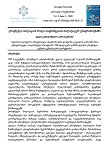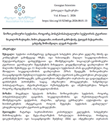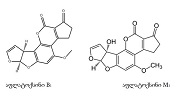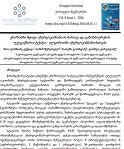The Strategic Role of the Pharmacist in Environmental Risk Management

Downloads
The environmental consequences of pharmaceutical substances have become a pressing global issue. Emerging interdisciplinary fields such as eco-pharmacology and eco-pharmacovigilance focus on studying and preventing the harmful effects of pharmaceutical products on ecosystems. This article examines the main routes through which these compounds enter the environment, including wastewater discharge, improper disposal of unused medications, veterinary drug usage in agriculture, and pharmaceutical industry waste. It outlines the environmental impacts of these pollutants, such as endocrine disruption in aquatic life (fish and amphibians), the spread of antibiotic resistance, imbalances in aquatic microbiomes, and growth inhibition in plants. The responsibilities of pharmacists now extend beyond traditional roles, involving the promotion of sustainable prescribing practices, educating patients, engaging in policy development with an environmental focus, and supporting systems for proper drug disposal. This article stresses the need for enhanced public awareness, cross-disciplinary cooperation, and the implementation of comprehensive strategies to maintain ecological safety in pharmaceutical practices, thereby protecting both human health and the environment.
Downloads
Rahman SZ, Khan RA, Gupta V, Uddin M. Pharmacoenvironmentology--a component of pharmacovigilance. Environ Health. 2007 Jul 24;6:20. doi: 10.1186/1476-069X-6-20. PMID: 17650313; PMCID: PMC1947975.
Dzidzornu, Ernest & Cherian, Jerin & D'souza, Joan & Pandit, Jayesh & Bernal, Melissa & Radovan, Diana. (2023). Ecopharmacovigilance: A review of cause, impact, and remedies. Medical Writing. 32. 118-121. 10.56012/rlhx7717.
Jun Wang, Shulan Li, Yujie Zhu, Jie Guo, Juan Liu, Bingshu He, Targeted eco-pharmacovigilance as an optimized management strategy for adverse effects of pharmaceuticals in the environment, Environmental Toxicology and Pharmacology, Volume 82, 2021, 103565,ISSN 1382-6689, https://doi.org/10.1016/j.etap.2020.103565.
Toma, Alexandra & Crisan, Ofelia. (2018). Green Pharmacy – A Narrative Review. Clujul Medical. 91. 10.15386/cjmed-1129.
Durdov, T., Perišin, A. Š., Škaro, N., Bukić, J., Leskur, D., Modun, D., Božić, J., Grgas, M., & Rušić, D. (2024). Future Healthcare Workers and Ecopharmacovigilance: Where Do We Stand? Pharmacy, 12(5), 146. https://doi.org/10.3390/pharmacy12050146
OECD. (2019). Pharmaceutical residues in freshwater: Hazards and policy responses. OECD Publishing. https://doi.org/10.1787/c936f42d-en
World Health Organization (WHO) & United Nations Environment Programme (UNEP). (2020). Sustainable health care waste management: Global review. WHO & UNEP. https://www.who.int/publications/i/item/9789240011632
European Medicines Agency (EMA). (2006). Guideline on the environmental risk assessment of medicinal products for human use. EMA/CHMP/SWP/4447/00. https://www.ema.europa.eu
Daughton, Christian & Ruhoy, Ilene. (2011). Green pharmacy and pharmEcovigilance: Prescribing and the planet. Expert review of clinical pharmacology. 4. 211-32. 10.1586/ecp.11.6.
European Medicines Agency. (2024). Guideline on the environmental risk assessment of medicinal products for human use (EMEA/CHMP/SWP/4447/00 Rev. 1 – Corr.). European Medicines Agency.https://www.ema.europa.eu/en/documents/scientific-guideline/guideline-environmental-risk-assessment-medicinal-products-human-use-revision-1_en.pdf
International Pharmaceutical Federation. (2015). Green pharmacy practice: Taking responsibility for the environmental impact of medicines. International Pharmaceutical Federation.https://www.fip.org/files/fip/publications/2015-12-Green-Pharmacy-Practice.pdf
Gubae K, Arega Moges T, Agegnew Wondm S, Bayafers Tamene F, Kiflu M, Aschale E, Belachew EA. Ecopharmacology: Knowledge, Attitude, and Medication Disposal Practice Among Pharmacy Students. Integr Pharm Res Pract. 2023 Oct 24;12:185-193. doi: 10.2147/IPRP.S428457. PMID: 37901480; PMCID: PMC10612519.
Copyright (c) 2025 Georgian Scientists

This work is licensed under a Creative Commons Attribution-NonCommercial-NoDerivatives 4.0 International License.

























































































































































































































